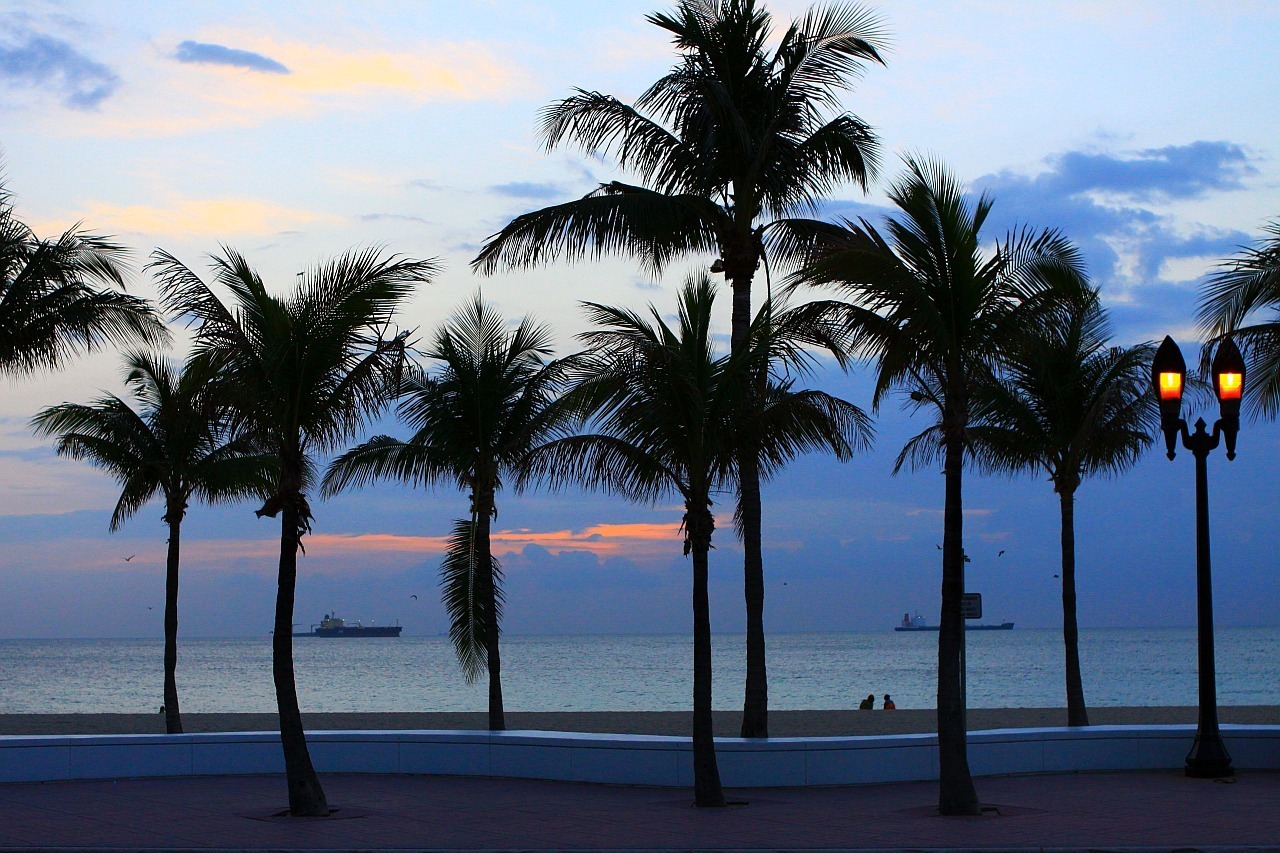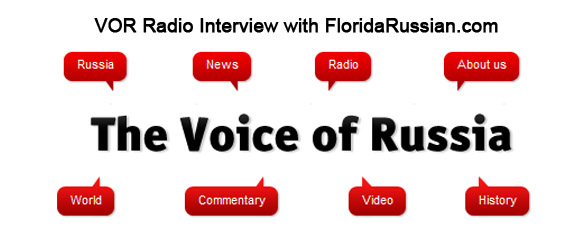The Voice of Russia radio program interviewed Jef Gray, publisher of Florida Russian Lifestyle Magazine on July 7, 2011. The interview focused on Russians living in Florida, cultural differences between the United States and Russia and how the community is growing . Jef also shared how he, an American, got involved in the community and business projects and the future plans for Florida Russian.com
Our thanks to Voice of Russia for the interview file and transcript, you can view the entire post here: http://english.ruvr.ru/2011/07/07/52904671.html
You can listen to the broadcast below, or read the transcript following.
Voice of Russia – FLorida Russian Lifestyle Magazine Interview
Transcript:
Joining us on the phone from Florida is Jeff Gray, a publisher for FloridaRussian.com.
First of all, what is FloridaRussian.com? And when you think about Russians coming to this country you don’t think about them settling in Florida. But you have quite a significant Russian-American population there, don’t you?
Yes, that’s correct. Quite a few Russians have an interest in – I guess, everybody from the Eastern Europe has an interest in – maybe going to Miami and have a vacation. But it’s actually settled by quite a few. There is some statistical stuff that varies – that 7% of the American population is Russian-speaking. But that’s the Russian language which was the language of the entire former Soviet Union, a much bigger group than just Russians. But yes, a lot of Russians have moved here. They live here, they raise families here, they retire here – a little bit of everything. And our site is sort of an outreach through the community in various cities to bring these folks together, let them know what is going on in the communities here, things to do, what’s the life here if you are considering moving here and things along that line.
So, basically your website is there to make sure that Russians, who emigrate to this country, have sort of a meeting place, right?
Yes, very true. Which is very important. I was a military child, a military brat, and lived around the world, in different cities and states, and countries. And I know what its like to be transplanted and have to start over. And I guess that I brought that with me when we started this project – creating a place for people to connect through various things, magazine and community.
But why actually start this? What was the impetus for this?
I get that question a lot. It all started with a girl, as most great stories do. I was single at the time and I met a Russian girl. I didn’t know she was Russian at that time. I just found out later she was. I met her on one of those dating sites, an American dating site, and she was from Russia. We got more acquainted, and things went on from there, and we ended up getting married after about two years. But it didn’t quite work out and we ended splitting up, unfortunately. But during that time it opened so many doors, like – I experienced Russia. I learned a lot about Russian culture. I traveled there and absolutely loved it. And everything I’d been told in the military – because I was also in the military – was a lie. It’s not a scary Soviet state that I had been convinced it was. When I went there and met the people, and learned about the culture, it just fascinated me up to this day. So, when she arrived here, I wanted to introduce her to other Russians but…Where do I go? And at that time there was no Odnoklassniki, no Facebook – that was all still quite new in 2004. So, we started a group for that very purpose – for Russians to meet. It just grew and grew and became a business, and opportunities, and tons of friends, and things like that.
Let’s compare what you were told about the Soviet Union Russia at that time and then what you personally experienced.
I thought it was this very scary place. I was terrified at first when I got on the plane to Russia. I was like, “What am I doing?”, because the image that you had in your head was this cold, snowing all the time, and everybody is just drunk and miserable, and hates their life, and they all wear black, and there is no sense of happiness for these people, and they are all atheists. And of course, none of that is true. But that is what I had been pumped full of, watching TV and things like this over the years.
What did you find when you got there?
I’ve been to Moscow three times, and to a few other cities as well. I’ve also been to Kazan, Naberezhnye Chelny. And what I’ve found out is that people – in some cases, like Moscow, which is quite a black-and-white city, and in some areas it’s just very grey, – but the people are definitely in colour. And reklama – there’s tons of advertising, and you see just movies and things to do, and so much energy, and everyone is hustling and rustling around, somewhat like the New York City. And I thought – that’s Moscow. Let me see how it is in other cities. Even more so, when you get away from Moscow, which is sort of its own country, you really get a sense of what life is like there, how the people are. They are incredibly warm and they celebrate life, I think, much more than Americans do in terms of friendship and family.
It sounds like you fell in love with Russia.
Oh, my gosh, yes! It changed my life! So, I would say, for people who have never been there, it’s like this – you know a lot about America by visiting other countries, how they see us, is it fair or not how they see us? I’ll make a little joke about Americans, but it’s fair: you can bump into someone you went to school or to college with and you’re like ‘Oh, my gosh! Haven’t seen you in years!’ You talk a few minutes and say ‘Man, I really missed you’, and then you go your merry way. That’s it. It’s very surface. There’s no depth to that. But Russians who grow up with the same classmates – it’s sometimes from the age of seven all the way to when they finish college – when they run into a classmate, it’s a big deal. They’ll make a party for that only reason, like ‘We’ll make a party tonight. Let’s do this, let’s do that’. And then they get together and they truly celebrate their family, their friends. Of course, none of that is told in the propaganda, but they really value a lot of things that Americans value – children, weddings… They are no different from us. They just see things differently than us. That’s all.
Given the fact that you’re in Florida and I guess most people want to live there because it’s warm and sunny, what was the impression that many of the Russians that you dealt with came away with, living in Florida, with the sunshine and basically two seasons that you have there? What was the reaction to that?
Most Floridians complain about the heat, but Russians, when they get off the plane, they are just like Ah! Maybe, because they left Moscow and it was cold, and they got off the plane a few hours later and feel that warm air and smell the salt in the air, and they just start smiling. I co-own a tour company called Florida Tur. It’s specifically for Russians coming here, VIP types. And no difference. Whether they are wealthy or not, they all have that same reaction. They get off the plane and just start smiling.
I think we all do if we are from the northeast.
They’ve been on the plane for 15 hours, they don’t care. They’re just excited.
Give me some idea how many Russian families that you deal with in the area you are in?
We have approximately about 500 Russian-American families that are either members or connected with our culture society or the community centre. The Russian-American Community Centre of Florida, which is the official title, has branch offices in multiple cities. And we are currently working to connect all of those now, we are trying not just to have an island of a Russian community: one system-one city. We are actually making all of them connect so that we can have events that can be statewide.
Is the community center growing?
Oh, yes. It is growing and we get a lot of people who either lived in the United States and then moved to Florida or moved here form the FSU. I think what attracts them is not just the weather, although that’s a big one, or job opportunities, which is snapping back from the economy glut now, but the idea that in all these established communities, I can connect here, just like Brighton Beach in New York or some other prominent cities like Washington D.C., or even Portland, where there’re big Russian communities. People tend to go there because they know it’ll be easier to blend in, to find friends, to connect, to establish yourself, to raise families, if that’s what you are interested in.
Do you feel that Russians coming into this country, especially the second generation, are still embracing their culture, their language, or are some of the younger ones not speaking the language, sort of leaving the culture, becoming more American?
A lot of that really falls on the parents. The ones that are in the culture society want their kids to grow up, going to the park, and having shashlyk, and all of the different festivals, and all of the common events like Easter, just different things that are done throughout the year. We do a big New Year parties and stuff like that. They want their kids to experience that, and they want their kids to speak Russian. The kids learn it at home, because their mother would always speak Russian to them. But there are some moms that say just me doing it alone is not enough, they aren’t going to pick it up. And then they get nervous. And there is one project from the community centre, when we started the first Russian school in Florida, so that little kids could go to a class so that they could actually learn to read and write Russian.
You’re in Central Florida, right?
Yes, we are in Orlando. And that’s what we would like to see propagated because there’s a big need, because those kids will lose Russian if they don’t learn to read and write, and speak it. So, it really falls on parents to keep it alive, but if there is a community, it’s so much easier because there’s an event you can go to and practice. That kind of thing.
Anything new on the horizon of FloridaRussian.com?
We are on a summer break right now. It was a year of an incredible amount of work, because the community centre and the magazine started at the same time, so it’s just, as they say in Russian, s uma shedshy. I was out of my head sometimes with how much work I had to do and I felt I need to slow down. So, we took the summer off and we are going to get back in the fall. Some of the things we are going to do on the iPad version of the magazine. We already have a version for the iPhone that you can download, in fact we were the first Russian magazine approved by Apple to be an app on the iPhone. Then we are going to do an iPad version, we are going to do more interactive content, where you can see videos of events and stuff in the magazine, where you are reading about it. Just some of the more modern things that magazines should do – we will bring that out and get more interaction from our readers, so that they are not just reading a magazine but posting comments where we involve them in polls and stuff like that.
About Voice of Russia:
The Voice of Russia was the first radio station to broadcast internationally. On the air since October 29th 1929, VOR has been shaping Russia’s image worldwide and introducing Russia to the world and highlighting its opinions on global events.
Today VOR broadcasts to 160 countries in 38 languages for a total of 151 hours per day, on short and medium waves, in the FM band, via satellite and through global mobile communications network. In 2003 VOR was among the major international radio broadcasters to launch daily broadcasts to Europe in Digital Radio Mondiale.
VOR programs are broadcast to the USA through satellite channels of the global network, by cable, in the FM band, and through mobile communicatiion links in 16 states. VOR is among the world’s top five radio broadcasters which include the BBC, the Voice of America, Deutsche Welle and Radio France International. According to a survey carried out by International Media Help (Switzerland) among radio listeners in 50 countries, VOR is the third in popularity after the BBC and the Voice of America .
VOR broadcasts on the Internet in 33 languages and on its Website which boasts over 500 sections and is visited by people from 140 countries. Visitors can choose from on-line reports, audio, video and multimedia material.
VOR has 109 million listeners in 160 countries. In their opinion Voice of Russia provides a convenient and democratic channel to obtain information about Russia.
VOR is a member of the National Association of Television and Radio Broadcasters, the European Broadcasting Union, Digital Radio Mondiale and the Conference of International Broadcasters’ Audience Research. Many Voice of Russia programs have won the Radiomania national award. In 2008 Voice of Russia won the Runet Prize.
[table id=7 /]







